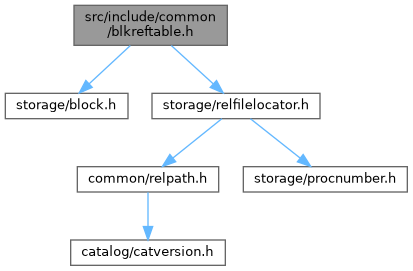

Go to the source code of this file.
Macros | |
| #define | BLOCKREFTABLE_MAGIC 0x652b137b |
Typedefs | |
| typedef struct BlockRefTable | BlockRefTable |
| typedef struct BlockRefTableEntry | BlockRefTableEntry |
| typedef struct BlockRefTableReader | BlockRefTableReader |
| typedef struct BlockRefTableWriter | BlockRefTableWriter |
| typedef int(* | io_callback_fn) (void *callback_arg, void *data, int length) |
| typedef void(* | report_error_fn) (void *callback_arg, char *msg,...) pg_attribute_printf(2 |
| typedef void(*) BlockRefTable | CreateEmptyBlockRefTable) (void) |
Macro Definition Documentation
◆ BLOCKREFTABLE_MAGIC
| #define BLOCKREFTABLE_MAGIC 0x652b137b |
Definition at line 30 of file blkreftable.h.
Typedef Documentation
◆ BlockRefTable
Definition at line 32 of file blkreftable.h.
◆ BlockRefTableEntry
Definition at line 33 of file blkreftable.h.
◆ BlockRefTableReader
Definition at line 34 of file blkreftable.h.
◆ BlockRefTableWriter
Definition at line 35 of file blkreftable.h.
◆ CreateEmptyBlockRefTable
|
extern |
◆ io_callback_fn
Definition at line 46 of file blkreftable.h.
◆ report_error_fn
| typedef void(* report_error_fn) (void *callback_arg, char *msg,...) pg_attribute_printf(2 |
Definition at line 47 of file blkreftable.h.
Function Documentation
◆ BlockRefTableEntryGetBlocks()
|
extern |
Definition at line 369 of file blkreftable.c.
References Assert, BLOCKS_PER_CHUNK, BLOCKS_PER_ENTRY, BlockRefTableEntry::chunk_data, BlockRefTableEntry::chunk_usage, fb(), i, MAX_ENTRIES_PER_CHUNK, and BlockRefTableEntry::nchunks.
Referenced by GetFileBackupMethod().
◆ BlockRefTableEntryMarkBlockModified()
|
extern |
Definition at line 965 of file blkreftable.c.
References Assert, BLOCKS_PER_CHUNK, BLOCKS_PER_ENTRY, BlockRefTableEntry::chunk_data, BlockRefTableEntry::chunk_size, BlockRefTableEntry::chunk_usage, fb(), i, INITIAL_ENTRIES_PER_CHUNK, j, Max, MAX_ENTRIES_PER_CHUNK, BlockRefTableEntry::nchunks, palloc0(), palloc0_array, palloc_array, pfree(), and repalloc().
Referenced by BlockRefTableMarkBlockModified().
◆ BlockRefTableEntrySetLimitBlock()
|
extern |
Definition at line 894 of file blkreftable.c.
References Assert, BLOCKS_PER_CHUNK, BLOCKS_PER_ENTRY, BlockRefTableEntry::chunk_data, BlockRefTableEntry::chunk_usage, fb(), i, j, BlockRefTableEntry::limit_block, MAX_ENTRIES_PER_CHUNK, and BlockRefTableEntry::nchunks.
Referenced by BlockRefTableSetLimitBlock().
◆ BlockRefTableFreeEntry()
|
extern |
Definition at line 1121 of file blkreftable.c.
References BlockRefTableEntry::chunk_data, BlockRefTableEntry::chunk_size, BlockRefTableEntry::chunk_usage, fb(), and pfree().
◆ BlockRefTableGetEntry()
|
extern |
Definition at line 340 of file blkreftable.c.
References Assert, fb(), BlockRefTable::hash, and BlockRefTableEntry::limit_block.
Referenced by GetFileBackupMethod().
◆ BlockRefTableMarkBlockModified()
|
extern |
Definition at line 297 of file blkreftable.c.
References BlockRefTableEntryMarkBlockModified(), fb(), BlockRefTable::hash, InvalidBlockNumber, BlockRefTable::mcxt, and MemoryContextSwitchTo().
Referenced by PrepareForIncrementalBackup(), and SummarizeWAL().
◆ BlockRefTableReaderGetBlocks()
|
extern |
Definition at line 689 of file blkreftable.c.
References Assert, BlockRefTableRead(), BLOCKS_PER_CHUNK, BLOCKS_PER_ENTRY, BlockRefTableReader::chunk_data, BlockRefTableReader::chunk_position, BlockRefTableReader::chunk_size, BlockRefTableReader::consumed_chunks, fb(), MAX_ENTRIES_PER_CHUNK, and BlockRefTableReader::total_chunks.
Referenced by dump_one_relation(), pg_wal_summary_contents(), and PrepareForIncrementalBackup().
◆ BlockRefTableReaderNextRelation()
|
extern |
Definition at line 613 of file blkreftable.c.
References Assert, BlockRefTableRead(), BlockRefTableReader::buffer, BlockRefTableReader::chunk_size, BlockRefTableReader::consumed_chunks, BlockRefTableBuffer::crc, EQ_CRC32C, BlockRefTableReader::error_callback, BlockRefTableReader::error_callback_arg, BlockRefTableReader::error_filename, fb(), FIN_CRC32C, palloc_array, pfree(), and BlockRefTableReader::total_chunks.
Referenced by main(), pg_wal_summary_contents(), and PrepareForIncrementalBackup().
◆ BlockRefTableSetLimitBlock()
|
extern |
Definition at line 262 of file blkreftable.c.
References BlockRefTableEntrySetLimitBlock(), fb(), and BlockRefTable::hash.
Referenced by PrepareForIncrementalBackup(), SummarizeDbaseRecord(), SummarizeSmgrRecord(), and SummarizeXactRecord().
◆ BlockRefTableWriteEntry()
|
extern |
Definition at line 817 of file blkreftable.c.
References BlockRefTableWrite(), BlockRefTableEntry::chunk_data, BlockRefTableEntry::chunk_usage, fb(), BlockRefTableKey::forknum, j, BlockRefTableEntry::key, BlockRefTableEntry::limit_block, BlockRefTableEntry::nchunks, BlockRefTableKey::rlocator, and BlockRefTableSerializedEntry::rlocator.
◆ CreateBlockRefTableEntry()
|
extern |
Definition at line 875 of file blkreftable.c.
References fb(), BlockRefTableKey::forknum, InvalidBlockNumber, BlockRefTableEntry::key, BlockRefTableEntry::limit_block, palloc0_object, and BlockRefTableKey::rlocator.
◆ CreateBlockRefTableReader()
|
extern |
Definition at line 577 of file blkreftable.c.
References BLOCKREFTABLE_MAGIC, BlockRefTableRead(), BlockRefTableReader::buffer, BlockRefTableBuffer::crc, BlockRefTableReader::error_callback, BlockRefTableReader::error_callback_arg, BlockRefTableReader::error_filename, fb(), INIT_CRC32C, BlockRefTableBuffer::io_callback, BlockRefTableBuffer::io_callback_arg, and palloc0_object.
Referenced by main(), pg_wal_summary_contents(), and PrepareForIncrementalBackup().
◆ CreateBlockRefTableWriter()
|
extern |
Definition at line 790 of file blkreftable.c.
References BLOCKREFTABLE_MAGIC, BlockRefTableWrite(), fb(), INIT_CRC32C, and palloc0_object.
◆ DestroyBlockRefTableReader()
|
extern |
Definition at line 773 of file blkreftable.c.
References BlockRefTableReader::chunk_size, fb(), and pfree().
Referenced by main(), pg_wal_summary_contents(), and PrepareForIncrementalBackup().
◆ DestroyBlockRefTableWriter()
|
extern |
Definition at line 855 of file blkreftable.c.
References BlockRefTableFileTerminate(), fb(), and pfree().
◆ WriteBlockRefTable()
|
extern |
Definition at line 474 of file blkreftable.c.
References Assert, BLOCKREFTABLE_MAGIC, BlockRefTableComparator(), BlockRefTableFileTerminate(), BlockRefTableWrite(), BlockRefTableBuffer::crc, fb(), BlockRefTable::hash, i, INIT_CRC32C, BlockRefTableBuffer::io_callback, BlockRefTableBuffer::io_callback_arg, j, palloc_array, qsort, and BlockRefTableSerializedEntry::rlocator.
Referenced by SummarizeWAL().